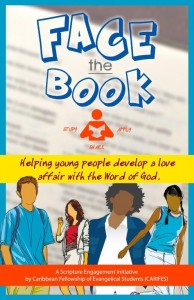(written by Josue Alanis, Cinthya Ocón, Fausto Romero staff of MUC El Salvador)
We are grateful to God for awakening our interest in his Word through IFES consultations on Scripture engagement. Now our desire is to pass on this interest to others in El Salvador. We have been doing so in different ways.
Over the past two years, we have been teaching a session on Scripture Engagement at our national training event for students. Each time, I (Cinthya) teach this session, I fall deeper in love with the Word. Repeatedly, I am amazed at what God is doing in the lives of students through his Word. And have come to realize just how important Scripture is for the Christian life.
During these past months, we also had the privilege of teaching young people from different churches about Scripture engagement. It was a joy to see their perspective on God’s Word change completely. One of the results is that they have become interested in the work of MUC at university. These sessions have opened a door for us to collaborate with young people from different churches.
The topic which sparks the most interest is reflecting on what it means to love, study, live and share the Word. We encourage young people to foster a real love for God and his Word. Studying, living and sharing the Word flow out of this love.
In an attempt to grow in how we address the challenges of our world biblically, one activity has been very enriching. We start by reading the reality of the country we live in. We ask the participants to create a collage from newspapers with the challenges, desires and fears of their fellow students. Then we ask them to find answers to these issues in the Bible. Many reply with individual Bible verses that give a superficial answer. We question these answers so that they realize how important it is to have a deeper biblical knowledge than just a few memorized verses that are known by almost the entire population of El Salvador. We finish this exercise with a small study on Habakkuk and how God’s answer to this prophet might relate to questions in our context. Our purpose is to see how we can hold the newspaper in one hand and the Bible in the other.

We have been able to touch the lives of over 150 students from MUC and over 50 young people from churches with sessions on Scripture engagement. God has been good and we have seen some young people commit to studying and loving God’s Word. Our church in El Salvador needs to abandon religiousness and have its love for Scripture rekindled.







 One of the high points of this consultation was a small group project, in which we worked together on the way in which God’s Word connects to the realities of our context. One aim of this exercise was to renew the good practice of coming back to the Scriptures when dealing with the challenges of our context thereby strengthening our conviction that Scripture is relevant to all of life.
One of the high points of this consultation was a small group project, in which we worked together on the way in which God’s Word connects to the realities of our context. One aim of this exercise was to renew the good practice of coming back to the Scriptures when dealing with the challenges of our context thereby strengthening our conviction that Scripture is relevant to all of life.
 study, which lasts about 45 minutes. We successively study complete books of the Bible. At the beginning of each semester, I send our calendar to the staff with the meeting dates and the people responsible for directing each weekly study. In this way, we have advanced a lot in our Bible studies over the past ten years: we have studied the Minor Prophets (they took us about a year and a half!), John and the epistles of John, Genesis, Revelation, Acts and we are currently studying Luke. The second part of our meeting contributes to the intimacy of our staff team. It is a time of mutual prayer and intercession. Each one of us shares their blessings and current struggles and is prayed for by the others. We also take time to pray for specific situations the movement is facing. Lastly, each one of us answers the question: What are you doing this week? This helps us organise our work and know what the other staff will be doing, even if they are 1,000 km away!
study, which lasts about 45 minutes. We successively study complete books of the Bible. At the beginning of each semester, I send our calendar to the staff with the meeting dates and the people responsible for directing each weekly study. In this way, we have advanced a lot in our Bible studies over the past ten years: we have studied the Minor Prophets (they took us about a year and a half!), John and the epistles of John, Genesis, Revelation, Acts and we are currently studying Luke. The second part of our meeting contributes to the intimacy of our staff team. It is a time of mutual prayer and intercession. Each one of us shares their blessings and current struggles and is prayed for by the others. We also take time to pray for specific situations the movement is facing. Lastly, each one of us answers the question: What are you doing this week? This helps us organise our work and know what the other staff will be doing, even if they are 1,000 km away! The Italian context in which I live is characterized by suspicion and skepticism. It surprises me that in this context more seekers than I would have expected are curious to study Bible passages in a safe place with other fellow seekers. And when they come, oh, it is fascinating to see their reactions: “My first impression was shocking: I discovered in the Bible a marvelous figure, so human when angry and indignant in the face of unbelief and hypocrisy, and so divine in speaking with an authority never seen before… and even able to forgive his persecutors!’” says Gianluca, a medicine student.
The Italian context in which I live is characterized by suspicion and skepticism. It surprises me that in this context more seekers than I would have expected are curious to study Bible passages in a safe place with other fellow seekers. And when they come, oh, it is fascinating to see their reactions: “My first impression was shocking: I discovered in the Bible a marvelous figure, so human when angry and indignant in the face of unbelief and hypocrisy, and so divine in speaking with an authority never seen before… and even able to forgive his persecutors!’” says Gianluca, a medicine student.